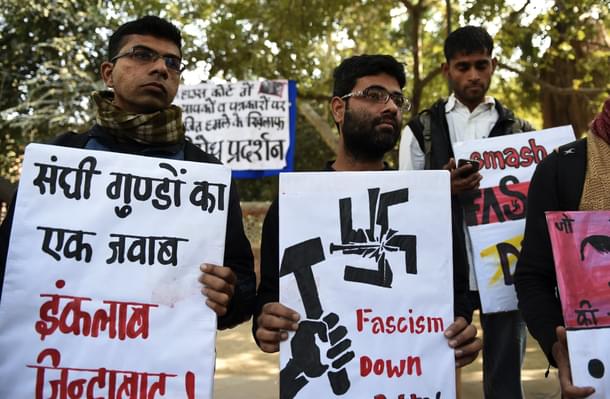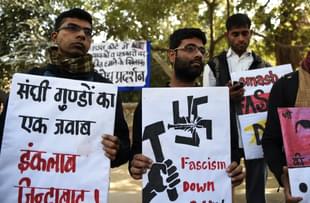Politics
JNU: The Protests Deserve Contempt, The Fee Hike Merits A Debate
Abhinav Prakash Singh
Nov 25, 2019, 01:34 PM | Updated 02:39 PM IST
Save & read from anywhere!
Bookmark stories for easy access on any device or the Swarajya app.


The Jawaharlal Nehru University (JNU) is once again in the midst of high drama. This time the issue is related to the new hostel rules. While most of the rules like timings, mess dress code etc are same as they have always been on paper, it’s the new hostel charges that are in the eye of the storm.
JNU has decided to increase the nominal hostel fees after decades, and it has sparked student protests cutting across party lines.
There are three angles to this opposition: first is opposition based on the argument that education must be free for all and public universities should be fully funded by the government.
Second is the opposition to what protesters say a sudden fee hike in the middle of the academic session, and that too without proper consultation with the students.
The third is the Left-wing anarchists hijacking the students’ protest to push for their long-held dream of paralysing the university as the stern vice-chancellor has refused to dance to their tunes. The Left, which has a free run in the university, has disrupted its functioning.
It is this third element that always receives most media coverage due to its capacity to create public nuisance as we have seen over the past few days. They stormed the hostel committee meeting, vandalised the office and held faculty hostage.
Even when the health of the dean of students took a turn for the worse, they mocked his condition and stopped the ambulance from reaching him, though they were not successful in this attempt. But, they prevented the ambulance from reaching the hospital in a brazen display of mob power, and forced it towards the university health centre, which lacks facilities to handle complicated cases. It is here they held the dean and his pleading family hostage for hours.
The gangs of Left-wing party workers have also been storming the classrooms where the faculty, who were part of the committee, has been taking classes, holding them hostage until they resign. They held a woman associate dean hostage for nearly 30 hours, subjected her to torture by continuously screaming at her and later tore her clothes.
It's rare to find such incidents of mob violence being not only completely ignored but also applauded as ‘democratic protests’. The same mob blocked a busy road in south-Delhi for hours to obstruct the route of the Human Resource and Development Minister, and later tried to disrupt the traffic across Delhi, which was however skilfully handled by the Delhi Police.
But then, why is the JNU Left behaving in such a brazen manner?
Firstly, after Kanhaiya Kumar, whose JNU Student Union presidency was a failure due to total inaction, became an accidental hero in the anti-India protests, a large number of the Left-wing party workers have been trying to replicate the model.
Different Left parties are trying to outdo each other by indulging in vandalism like attacking the house of the vice-chancellor to provoke police action against them. This they think will bring them into the national limelight and with the help of the friendly media they will also claim the knighthood in ‘resistance to fascism’.
Second, is the standard Left-wing apathy towards any vice-chancellor or faculty who is not one of them or refuses to join them.
Third, for the Left, this is not a student’s issue but just another front against the Bharatiya Janata Party-led central government. Their standard modus operandi, as Dr B R Ambedkar once described, is to organise the disorder. Not many know that the current JNUSU is still not recognised by the university due to a pending court case challenging the elections.
Since JNU administration cannot officially negotiate with the JNUSU, it tried to engage the elected representatives of the hostels which were prevented by the Left-wing party workers who are now accusing the JNU administration of not consulting the students.
Fourthly, the unrest will continue till the Delhi elections are over. Every time elections are around the corner, JNU conveniently erupts into ‘spontaneous protests’ over one issue or the other. Let’s not forget that they have rejected the concessions provided by the Ministry of Human Resources and Development (MHRD) unless the vice-chancellor is removed. It is after the MHRD driven concessions that they vandalised the office buildings and didn’t even spare the statue of Vivekananda.
It is clear that in JNU a legitimate issue is being used by the Left parties to drive their agenda but what about the issue of fee hike? In a poor country like India, where education is the most important instrument of social mobility, the argument for a free public education system is a strong one.
The arguments in favour of the publicly-funded universal provision of health and education are quite persuasive. This is one of the reasons why developed countries are where they are today. They have put in place a system that supports their development journey.
In India too, a large section of its middle class owes its growth to the publicly-funded schools and colleges. It is ironic for it to try to kick down the ladder and call others ‘freeloaders’ and ‘parasites’.
We would be wise not to mix the Left-wing vandalism with the legitimate issue of the students that is not confined just to the JNU. Over the past decades, quality education is becoming unaffordable for a vast majority of Indians due to rising fees and cost of accommodation. The cost of professional courses like engineering, management, medical education has become a burden even on well-to-do families.
Those days are long gone when children of average families from villages would grow up to become doctors and engineers. This is an issue that can no longer be brushed aside because it strikes at the root of the promise on which the republic of India is built; socio-economic mobility.
Successive governments since Independence have neglected both health and education as a policy priority. Now is the time for course correction if India is to indeed become a $5 trillion economy.
In JNU, it is time for the administration to put all the information about the financial health of the university in public including the pending mess bills, rule violations by students, like for instance, by using air-conditioners in hostel rooms etc. The administration must invite suggestions in writing from students to solve these issues.
This will be the perfect route to open up a dialogue with the students who are serious about their education and functioning of their university, and weed out those who see JNU only as a platform for their political career.
Note: This piece wrongly carried an image of Mr Nadeem Khan implying him to be a protestor on behalf of JNU when he was not. The image has now been replaced and the error is regretted.
Abhinav Prakash Singh is an Assistant Professor at the University of Delhi.





